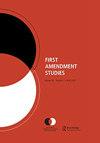新的美国之声:反外国宣传和虚假信息法案
Q2 Social Sciences
引用次数: 6
摘要
就在2016年圣诞假期周末之前,美国总统奥巴马悄悄签署了2017年国防授权法案(NDAA)。该法案的深层内容是一项有争议的条款,名为《打击外国宣传和虚假信息法》(Countering Foreign Propaganda and Disinformation act,简称CFPDA),该条款在国务院下设立了一个全球参与中心,并将几个联邦广播机构的权力整合到一个机构之下。该中心将协调反击外国宣传的努力,这些宣传主要来自俄罗斯和中国,旨在破坏美国的国家安全利益。权力的巩固给美国之音等媒体的新闻独立性和可信度带来了一些担忧。特朗普新政府与俄罗斯的友好关系也给打击俄罗斯虚假信息和宣传的承诺带来了不确定性。本文认为,美国实际上确实需要某种专门从事反宣传的政府实体,然后得出结论,CFPDA存在缺陷和漏洞,特别是缺乏足够的行政监督。基于这一结论,以及从其他国家如何应对俄罗斯的虚假信息运动中收集到的经验教训,本文就有效的治理结构应该是什么样子提出了初步建议。本文章由计算机程序翻译,如有差异,请以英文原文为准。
The new voice of America: Countering Foreign Propaganda and Disinformation Act
Abstract Just before the 2016 Christmas holiday weekend, President Barack Obama quietly signed the 2017 National Defense Authorization Act (NDAA) into law. Deep within the act is a controversial provision called the Countering Foreign Propaganda and Disinformation Act (CFPDA), which establishes a Global Engagement Center under the State Department and consolidates the power of several federal broadcasting entities under one authority. This center will coordinate efforts to counter foreign propaganda, mainly from Russia and China, that is aimed at undermining the United States’ national security interests. The consolidation of power creates some concerns regarding journalistic independence and credibility for media outlets such as the Voice of America. The new Trump administration’s perceived amicable relationship with Russia also generates uncertainty around the commitment to fight Russian disinformation and propaganda. This essay argues that the US does in fact need some kind of governmental entity devoted to the creation of counter-propaganda, and then concludes there are deficiencies and vulnerabilities with the CFPDA, especially a lack of adequate administrative oversight. Based on this conclusion, as well as on lessons gleaned from how other nations have dealt with Russian disinformation campaigns, the essay offers tentative recommendations as to what an effective governing structure would look like.
求助全文
通过发布文献求助,成功后即可免费获取论文全文。
去求助
来源期刊

First Amendment Studies
Social Sciences-Law
自引率
0.00%
发文量
0
期刊介绍:
First Amendment Studies publishes original scholarship on all aspects of free speech and embraces the full range of critical, historical, empirical, and descriptive methodologies. First Amendment Studies welcomes scholarship addressing areas including but not limited to: • doctrinal analysis of international and national free speech law and legislation • rhetorical analysis of cases and judicial rhetoric • theoretical and cultural issues related to free speech • the role of free speech in a wide variety of contexts (e.g., organizations, popular culture, traditional and new media).
 求助内容:
求助内容: 应助结果提醒方式:
应助结果提醒方式:


